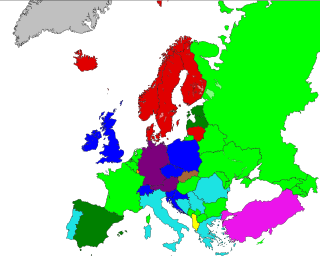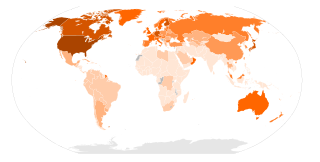A television network or broadcaster is a telecommunications network for distribution of television program content, whereby a central operation provides programming to many television stations or pay television providers. Until the mid-1980s, television programming in most countries of the world was dominated by a small number of terrestrial networks. Many early television networks evolved from earlier radio networks.

BBC World News is an international pay television channel that is operated by BBC. The BBC is a public corporation of the UK government's Department for Digital, Culture, Media and Sport. It has the largest audience of any channel, with an estimated 121 million viewers weekly in 2016/2017, part of the estimated 372 million weekly audience of the BBC's four main international news services. Launched on 11 March 1991 as BBC World Service Television outside Europe, its name was changed to BBC World on 16 January 1995 and to BBC World News on 21 April 2008. It broadcasts news bulletins, documentaries, lifestyle programmes and interview shows. Unlike the BBC's domestic channels, BBC World News is owned and operated by BBC Global News Ltd., part of the BBC's commercial group of companies, and is funded by subscription and advertising revenues, and not by the United Kingdom television licence. It is not owned by BBC Studios. The service is aimed at the overseas market, similar to CNN International, DW, NHK World, and RT.

A television licence or broadcast receiving licence is a payment required in many countries for the reception of television broadcasts, or the possession of a television set where some broadcasts are funded in full or in part by the licence fee paid. The fee is sometimes also required to own a radio or receive radio broadcasts. A TV licence is therefore effectively a hypothecated tax for the purpose of funding public broadcasting, thus allowing public broadcasters to transmit television programmes without, or with only supplemental, funding from radio and television advertisements. However, in some cases the balance between public funding and advertisements is the opposite – the Polish TVP broadcaster receives more funds from advertisements than from its TV tax.
The Canadian Broadcasting Corporation, branded as CBC/Radio-Canada, is a Canadian federal Crown corporation that serves as the national public broadcaster for both radio and television. The English- and French-language service units of the corporation are commonly known as CBC and Radio-Canada, respectively.
Children's television series are television programs designed for children, normally scheduled for broadcast during the morning and afternoon when children are awake. They can sometimes run during the early evening, allowing younger children to watch them after school. The purpose of these shows is mainly to entertain and educate.
In the United Kingdom, the term "public service broadcasting" refers to broadcasting intended for public benefit rather than to serve purely commercial interests. The communications regulator Ofcom requires that certain television and radio broadcasters fulfil certain requirements as part of their license to broadcast. All of the BBC's television and radio stations have a public service remit, including those that broadcast digitally.
Public broadcasting involves radio, television and other electronic media outlets whose primary mission is public service. In many countries of the world, funding comes from governments, especially via annual fees charged on receivers. In the United States, public broadcasters may receive some funding from both federal and state sources, but generally most of their financial support comes from underwriting by foundations and businesses, along with audience contributions via pledge drives. The great majority operate as private not-for-profit corporations.
Canada has a well-developed media sector, but its cultural output – particularly in English films, television shows, and magazines – is often overshadowed by imports from the United States. Television, magazines, and newspapers are primarily for-profit corporations based on advertising, subscription, and other sales-related revenues. Nevertheless, both the television broadcasting and publications sectors require a number of government interventions to remain profitable, ranging from regulation that bars foreign companies in the broadcasting industry to tax laws that limit foreign competition in magazine advertising.

The National Association of Broadcasters (NAB) is a trade association and lobby group representing the interests of commercial and non-commercial over-the-air radio and television broadcasters in the United States. The NAB represents more than 8,300 terrestrial radio and television stations as well as broadcast networks.
Free-to-air (FTA) are television (TV) and radio services broadcast in clear (unencrypted) form, allowing any person with the appropriate receiving equipment to receive the signal and view or listen to the content without requiring a subscription, other ongoing cost, or one-off fee. In the traditional sense, this is carried on terrestrial radio signals and received with an antenna.

Australia has a modern and diverse media industry spanning traditional and digital formats, and catering mostly to its predominantly English-speaking population. In 2018 the Press Freedom Index ranked Australia 19th out of 180 countries, although by 2020 Australia's ranking had somewhat declined to 26th out of 180 countries.
Religious broadcasting is the dissemination of television and/or radio content that intentionally has religious ideas, religious experience, or religious practice as its core focus. In some countries, religious broadcasting developed primarily within the context of public service provision, whilst in others, it has been driven more by religious organisations themselves. Across Europe and in the US and Canada, religious broadcasting began in the earliest days of radio, usually with the transmission of religious worship, preaching or "talks". Over time, formats evolved to include a broad range of styles and approaches, including radio and television drama, documentary, and chat show formats, as well as more traditional devotional content. Today, many religious organizations record sermons and lectures, and have moved into distributing content on their own web-based IP channels.
There are several different types of mass media in the United Kingdom: television, radio, newspapers, magazines and websites. The country also has a strong music industry. The United Kingdom has a diverse range of providers, the most prominent being the publicly owned public service broadcaster, the British Broadcasting Corporation (BBC). The BBC's largest competitors are ITV plc, which operates 13 of the 15 regional television broadcasters that make up the ITV Network, and American global media conglomerate Comcast, which owns the broadcaster Sky Ltd. Regional media is covered by local radio, television and print newspapers. Trinity Mirror operates 240 local and regional newspapers, as well as national newspapers such as the Daily Mirror and the Sunday Mirror.
Commercial broadcasting is the broadcasting of television programs and radio programming by privately owned corporate media, as opposed to state sponsorship. It was the United States′ first model of radio during the 1920s, in contrast with the public television model in Europe during the 1930s, 1940s and 1950s, which prevailed worldwide, except in the United States and Brazil, until the 1980s.

The geographical usage of television varies around the world with a number of different transmission standards in use and differing approaches by government in relation to ownership and programme content.

The Public Broadcasting Act of 1967 set up public broadcasting in the United States, establishing the Corporation for Public Broadcasting (CPB) and, eventually, the Public Broadcasting Service (PBS), and National Public Radio (NPR).
A regional variation generally refers to times when a radio station or television station simultaneously broadcasts different programmes, continuity or advertisements to different parts of its coverage area. This may be so as to provide programming specific to a particular region, such as local news or may be so as to allow advertisements to be targeted to a particular area.
Analogue terrestrial television in the United Kingdom was originally the method by which the significant majority of viewers in the UK, the Channel Islands and the Isle of Man received television. Analogue terrestrial television broadcasts have ceased everywhere in the UK with Northern Ireland being the last region to have ceased broadcasting analogue terrestrial television broadcasts. Northern Ireland switched off the last analogue television signals, making all of the United Kingdom only capable of receiving digital television, in the early hours of 24 October 2012. It has been completely replaced by digital terrestrial television and other non-terrestrial means as of the end of 2012.

A television show is any content produced for viewing on a television set and broadcast via over-the-air, satellite, cable, - excluding breaking news, advertisements, or trailers that are typically placed between shows. Television shows are most often scheduled for broadcast well ahead of time and appear on electronic guides or other TV listings, but streaming services often make them available for viewing anytime.

The Public Broadcasting Service (PBS) is an American public broadcaster and television program distributor. It is a nonprofit organization and the most prominent provider of educational television programming to public television stations in the United States, distributing series such as American Experience, America's Test Kitchen, Antiques Roadshow, Arthur, Barney & Friends, Clifford the Big Red Dog, Downton Abbey, Finding Your Roots, Frontline, The Magic School Bus, Masterpiece, Mister Rogers' Neighborhood, Nature, Nova, the PBS NewsHour, Reading Rainbow, Sesame Street, Teletubbies, Keeping up Appearances and This Old House.







